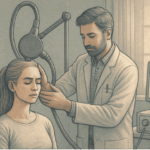What Is High Functioning Anxiety? Symptoms, Causes, and How to Manage It

You never miss a deadline. You’re super-organized, driven, and prepared for anything. To the outside world, you look like you’ve got it all together. But inside? That might be an entirely different story…
You’re always overthinking, and your mind doesn’t stop racing – not even when trying to sleep. No matter how much you achieve, it never feels like enough. If all this sounds too familiar, you might be experiencing something called “high functioning anxiety.”
High functioning anxiety may not be given a clinical diagnosis, but this doesn’t mean the struggle isn’t real. Many adults, especially high achievers in stressful careers, experience it and can relate to the exhaustion it brings.
If you suspect that you or a loved one has high-functioning anxiety, a mental health professional can shed light on your difficulties and their root causes – bringing much-needed relief. This article can also help, as it looks at:
- What high functioning anxiety is
- The signs of high functioning anxiety
- How high functioning anxiety relates to perfectionism and burnout
- Ways of coping with high-functioning anxiety

What Is High-Functioning Anxiety?
Anxiety conditions are pretty common; in the U.S, nearly one in five adults experiences them.1 But these conditions are the ones we know about. Many more people live with a type of anxiety that doesn’t stop them from functioning, and actually drives them to perform at very high levels.
If you have high functioning anxiety, you may seem calm and productive on the outside, but inside, there’s a constant noise of worry, self-doubt, or feeling you have to be perfect. But is high functioning anxiety real?
Although high functioning anxiety isn’t a diagnosis listed in the Diagnostic and Statistical Manual of Mental Disorders (DSM-5), the answer is “yes.” You can be high-achieving and anxious.2 It’s a term used to describe people who have anxiety symptoms and still manage to function well in many aspects of life, such as their career. It is usually diagnosed as generalized anxiety disorder.3
High functioning anxiety is often hidden, or masked, by the person experiencing it. They may feel very uncomfortable and anxious inside, but appear to have it “all together” to others. Yet, just because it doesn’t look like “typical” anxiety doesn’t mean it isn’t affecting the person with it.
People with high functioning anxiety tend to be constantly living in fight-or-flight mode. They’re plagued by worries, while somehow managing to turn up and do what they need to do each day to appear successful to the world.
High Functioning Anxiety Symptoms
When you imagine a person with anxiety, you may picture someone looking nervous, worrying, or perhaps even breaking down. However, the signs of high functioning anxiety in adults can be quite different. You may not notice signs from the outside, but if you were to take a deeper look, hidden symptoms can become more obvious.
Let’s take a look at some of the signs of high functioning anxiety, and break them down into internal anxiety vs external symptoms.
Internal Anxiety (hidden signs of anxiety disorder):3,5,6
- Racing thoughts
- Constant mental to-do lists
- Fear of failure (even when doing well)
- Feeling a sense of dread or doom
- Chronic overthinking
- Difficulty relaxing
- Stress
- Feeling like your self-worth depends on your achievements
- Rumination (dwelling on negative thoughts)
- People pleasing
- Fear of criticism from others
- Harsh self-criticism
- Fear of looking foolish or inadequate
- Being a perfectionist
- Having impostor syndrome
External Anxiety (the things people can see):3,5,6
- Excessive sweating
- Feeling light-headed
- Headaches
- Nervous habits, like fiddling with hair or biting nails
- Stomach problems
- Tense muscles
- Racing heart
- Sleep problems
- Tingling in toes or fingers
- Nervous talking
- Arriving too early for appointments
- Asking people for reassurance
- Fatigue or exhaustion
- Controlling when it comes to things being done “right”
Perfectionism, High Functioning Anxiety, and Burnout
If you live with high-functioning anxiety, you may be the one who stays late at work to “get the job done,” or have a never-ending to-do list. One of the biggest drivers behind these actions and feelings could be perfectionism. Let’s take a close look at how perfectionism could lead to anxiety and burnout.
Perfectionism and Anxiety
Perfectionism isn’t about just wanting to do well. It feels like a need. You may even think that if you can’t do things perfectly, or if you aren’t perfect, then maybe you have lost your worth or your meaning in life.
But what is “perfect”? That’s something we all see differently. What appears perfect to one person could be someone else’s nightmare. In essence, perfection doesn’t really exist. If you are a perfectionist, you could be striving to achieve impossibly high standards for yourself that can never be reached.
Additionally, perfectionism and anxiety can fuel each other in a vicious circle. The perfectionism keeps your anxiety going by telling you that you aren’t doing enough. And the anxiety fuels the need to get everything right, or to be perfect, so that you can feel ok. It’s like being on a merry-go-round of exhaustion and worry.
Anxiety and Burnout
High functioning anxiety can affect many different areas of your life, such as work, health, and relationships. Think of it like a swan on a lake. On the surface, the swan looks peaceful, calm, and graceful. Yet below the surface, its feet are frantically paddling to keep it afloat.
Your mind and body are working so hard to keep control and do things “just right.” It can be exhausting. Eventually, this intense drive to achieve and avoid failure can lead to burnout. You end up feeling exhausted physically, emotionally, and mentally, and with no enthusiasm. You may even find you can no longer carry out your duties at work or home. This is how powerful burnout can be.7 It’s essentially your body and brain’s way of saying, I can’t keep doing this anymore. I need to stop.
You can still be a successful person without striving for perfection or getting burnt out. It means taking a different approach, one that’s based on kindness and self-care, rather than harsh self-criticism.
5 Tips for Coping With High Functioning Anxiety
If you’ve been living with high functioning anxiety, you’ve probably gotten pretty good at managing – or hiding – your anxiety. But coping doesn’t mean you have to keep pushing ahead. Nor is it putting your head in the sand and thinking, I’m fine, it’s fine, everything is fine, while your mind feels like it’s on fire.
The way forward is rooted in self-care, compassion, and kindness. Whether you’re interested in managing anxiety in high-stress jobs or your daily life, we’ve got coping strategies to share with you. These are practical ways to build a more compassionate relationship with your thoughts and inner critic.3
Tip 1. Forget the Comparisons
Have you heard the sayings “The grass is greener on the other side” or “Comparison is the thief of joy?” When you compare yourself to others, you usually see their strengths or the nice things they have, and forget about your own. It can make you feel unsatisfied and anxious – as though you need to be doing better somehow. You don’t need to compare yourself to anyone else: you are unique.
Tip 2. Practice Mindfulness
Mindfulness and meditation can be a great way to manage anxiety. The point of meditation and mindfulness is to be aware in the present moment. This means observing your thoughts, feelings, and bodily sensations without reacting to them.8
A common analogy in mindfulness is imagining that your mind is the sky, and thoughts are clouds drifting across it. You don’t have to pay extra attention or cling to particular clouds; you can learn to let them just drift in and out of view. This allows you to pause and see them for what they are: thoughts, not facts.
Mindfulness is also backed up by evidence. Studies have shown that meditative practices can reduce symptoms of anxiety, improve sleep, and improve overall mood.9,10 If you’re looking for ideas, check out our free resources below:
Tip 3. Enhance Your Self-Care
Self-care can reduce your anxiety, make you feel calmer, and improve your self-worth. But it isn’t all about manicures and bubble baths. It’s anything you do that focuses on your well-being.
Self-care can also help with stress, self-esteem, and getting better sleep.11-14 You want to make sure that you are looking after yourself, physically, mentally, and emotionally. For example, eating nutritious food, getting exercise, stress management, having time to rest, and doing hobbies you enjoy. If you’re not sure how to create a self-care routine that works for you, check out our page “How to Build a Self-Care Routine for Mental Wellness.”
Tip 4. Setting Boundaries and Saying “No”
If you are a “people pleaser”, setting boundaries may feel tricky. How often have you said “yes” to an invitation because you didn’t want to disappoint someone, only to regret it later? We often take on too much and try to achieve it, believing we are superhuman. Unfortunately, this can leave us feeling utterly exhausted and drained. Learning how to set boundaries and say “no” can be a real game-changer.
Tip 5. Seek Professional Support
When coping strategies aren’t cutting the mustard, you may want to consider seeking support from a professional. Therapy for high functioning anxiety is an effective way to get the help you need.
For instance, approaches such as cognitive behavioral therapy (CBT) can help you understand your anxiety better and the links between what you do, how you think, and how you feel. You can then learn ways to challenge unhelpful thoughts or behaviors that keep anxiety going, discovering new strategies that work specifically for you.
We’re all unique, and there isn’t a one-size-fits-all solution when it comes to conditions of the mind, such as anxiety. It’s important to go with strategies that feel right and work for you. So don’t be afraid to experiment with different techniques to find ones that gel with you best.
If you are struggling with anxiety and are looking for professional support, Mission Connection can help. CBT is one of the key approaches used by our therapists, and working with us ensures that you receive evidence-based treatment tailored to your needs. We will provide a safe and supportive environment for you to explore your thoughts and emotions, to grow, and to recover.
Find Professional Support at Mission Connection
High functioning anxiety can seem invisible to the outside world, but the impact it has on your mind and body is very real. The good news is that you don’t have to struggle alone in silence. There are ways to manage this anxiety that aren’t just “coping.” You can heal, recover, and be kind to yourself.
Therapy for high functioning anxiety is a big step toward creating change that lasts. Whether you’re a professional in a high-stress job, a perfectionist who’s always “on,” or someone trying to hold it all together, we’re here to help.
Seeking support takes strength, and we will support you every step of the way. At Mission Connection, we specialize in helping adults improve their well-being and heal from mental health conditions. Using evidence-based techniques and therapies, our team of licensed, compassionate professionals can help you take control of your recovery and find a calmer way forward.
If you are ready to discover what healing could look like for you, reach out to us at Mission Connection to find out more.

References
- National Alliance on Mental Illness. (2025, January 3). Anxiety Disorders https://www.nami.org/about-mental-illness/mental-health-conditions/anxiety-disorders
- American Psychiatric Association. (2013). Diagnostic and statistical manual of mental disorders (5th ed.). https://doi.org/10.1176/appi.books.9780890425596
- Hubbard, L. (2023, July 11). Behind the mask: Managing high-functioning anxiety. Mayo Clinic Health System. https://www.mayoclinichealthsystem.org/hometown-health/speaking-of-health/managing-high-functioning-anxiety
- Cleveland Clinic. (2025, June 17). Signs you have High-Functioning Anxiety. https://health.clevelandclinic.org/what-is-high-functioning-anxiety
- Cuncic, A. (2023, June 21). The Characteristics of High-Functioning Anxiety. Verywell Mind. https://www.verywellmind.com/what-is-high-functioning-anxiety-4140198
- Calm Editorial Team. (2024, March 6). 12 signs of high-functioning anxiety and how to manage it. Calm Blog. https://www.calm.com/blog/high-functioning-anxiety
- WebMD. 2024, March 5). Burnout: symptoms and signs. https://www.webmd.com/mental-health/burnout-symptoms-signs
- Lindberg, S. (2023, October 13). What it’s like to have high-functioning anxiety. Headspace. https://www.headspace.com/articles/high-functioning-anxiety
- Hofmann, S. G., Sawyer, A. T., Witt, A. A., & Oh, D. (2010). The effect of mindfulness-based therapy on anxiety and depression: A meta-analytic review. Journal of Consulting and Clinical Psychology, 78(2), 169–183. https://pmc.ncbi.nlm.nih.gov/articles/PMC2848393/
- Li, P., Mao, L., Hu, M., Lu, Z., Yuan, X., Zhang, Y., & Hu, Z. (2022). Mindfulness on rumination in patients with depressive disorder: A systematic review and meta-analysis of randomized controlled trials. International Journal of Environmental Research and Public Health, 19(23), 16101. https://doi.org/10.3390/ijerph192316101
- Pilkington, K., & Wieland, L. S. (2020). Self-care for anxiety and depression: A comparison of evidence from Cochrane reviews and practice to inform decision-making and priority-setting. BMC Complementary Medicine and Therapies, 20(1), Article 171. https://doi.org/10.1186/s12906-020-03038-8
- Ayala, E. E., Winseman, J. S., Johnsen, R. D., & Mason, H. R. C. (2018). U.S. medical students who engage in self-care report less stress and higher quality of life. BMC Medical Education, 18(1), Article 189. https://doi.org/10.1186/s12909-018-1296-x
- NHS. (2025, January 15). Raising low self-esteem. https://www.nhs.uk/mental-health/self-help/tips-and-support/raise-low-self-esteem/
- National Institutes of Health. (2024, June 18). Good sleep for good health. NIH News in Health. https://newsinhealth.nih.gov/2021/04/good-sleep-good-health






